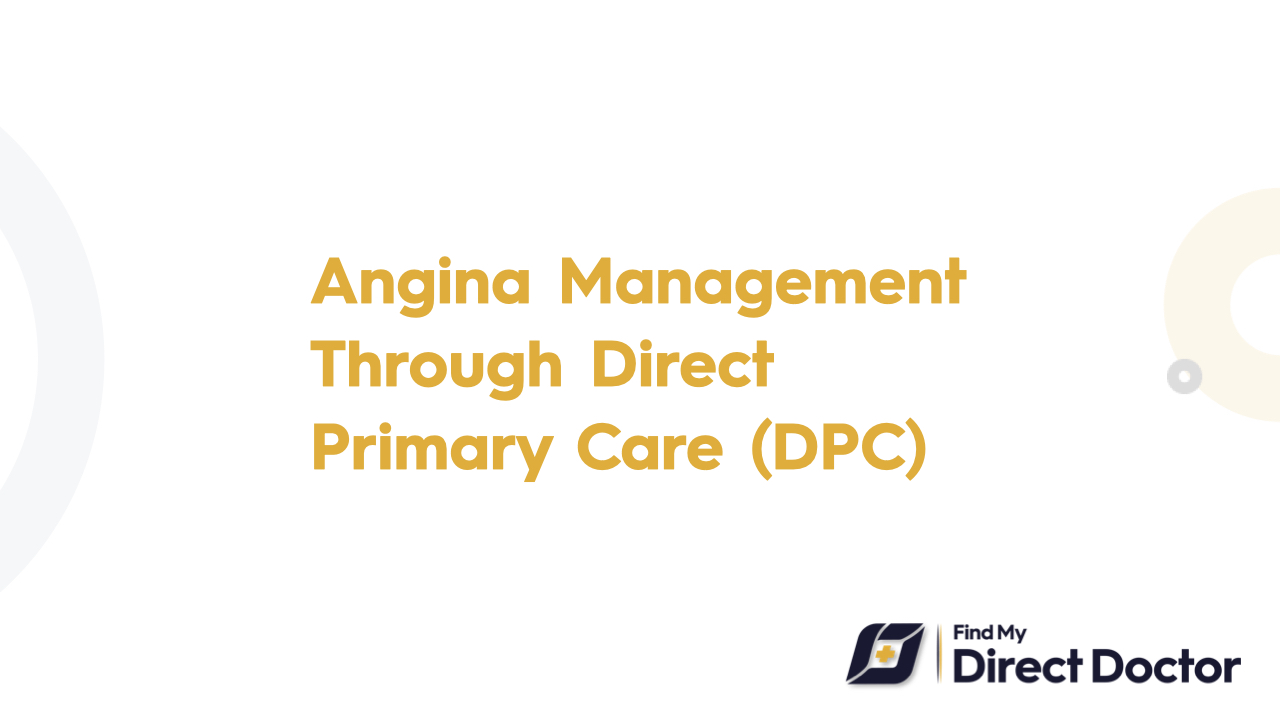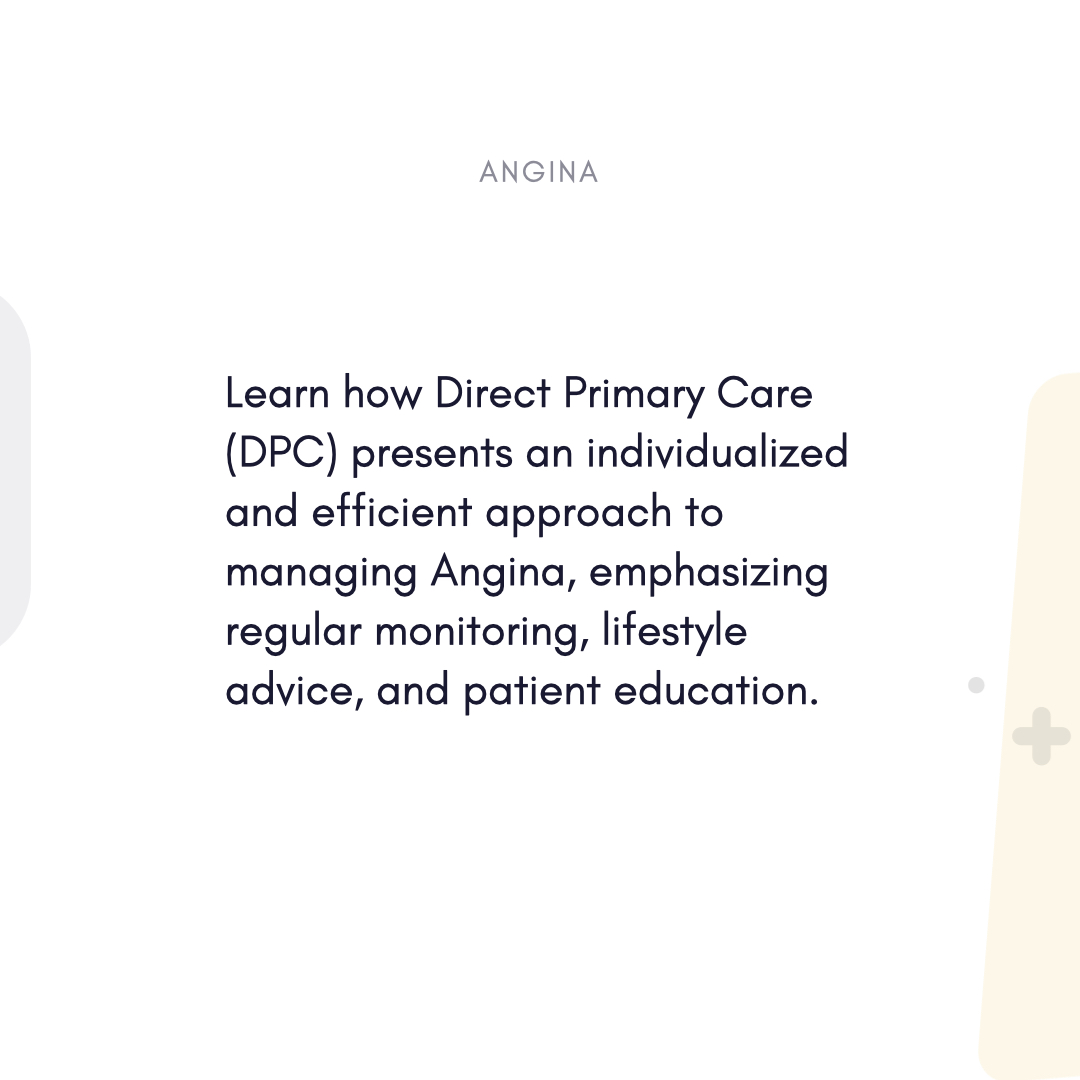Angina and Direct Primary Care (DPC): Personalized, Proactive Care for Heart Health
Often a warning indicator of coronary artery disease is angina, chest discomfort brought on by decreased blood flow to the heart. To stop heart attacks, managing angina calls for quick intervention, lifestyle changes, and ongoing surveillance. Combining fast diagnostics, customized treatments, and preventative strategies to increase quality of life and lower cardiac risks, Direct Primary Care (DPC) provides a patient-centered approach to angina care.

Knowing Angina: Major Obstacles
- Types:
- Variant (Prinzmetal) angina (caused by spasms).
- Stable angina (predictable with exertion).
- Unstable angina (unpredictable, higher risk).
- Symptoms include: Nausea, shortness of breath, coughing, radiating pain to arms or jaw.
- Causes: Arterial spasms, anemia, arrhythmias, or plaque accumulation—coronary artery disease.
- Complications: Heart attack, arrhythmias, heart failure.
How DPC Improves Control of Angina
Offering unrestricted access to a primary care physician, Direct Primary Care (DPC) is a membership model (USD 50–USD 150/month). This means for those suffering with angina:
- No waiting for urgent chest pain or symptom changes evaluation.
- Open pricing—discounted drugs, heart tests, referrals to specialists.
- Holistic treatment addressing emotional well-being, lifestyle, and heart health.
1. Rapid Risk Stratification and Diagnosis
- Electrocardiograms (ECG) are in-office or at-home devices meant to identify arrhythmias or ischemia.
- Tests for troponin and CK-MB help to exclude heart attacks.
- Stress tests, echocardiograms, or angiograms paid for at cash-pay rates coordinate imaging.
2. Customized Plans of Treatment
Using American Heart Association (AHA) and American College of Cardiology (ACC) recommendations, DPC combines:
- Medications:
- Nitrates: USD 10–USD 20 vs. USD 50+ retail for acute relief nitroglycerin.
- To lower cardiac load and clotting, use beta-blockers or antiplatelets—metoprolol or aspirin.
- Calcium channel blockers: Amlodipine, for vasospastic angina.
- Methodologies of lifestyle:
- Referrals for cardiac rehabilitation for under supervision exercise.
- Programs for smoking cessation and dietary plans—the Mediterranean diet.
3. Constant Watching and Prevention
- Applications for tracking symptoms: Track frequency of chest pain, triggers, and drug response.
- Regular liver function tests help statins (atorvastatin) lower LDL cholesterol.
- Medications changed and home monitoring kits help control blood pressure.
DPC's Advantages for Angina Sufferers
- Enhanced Accessibility:
- Appointments for acute conditions or medication changes same-day or next-day.
- 24/7 telehealth support to ascertain ER needs during episodes of chest pain.
- Improved Continuity of Treatment:
- Strong relationships between patients and providers help increase treatment and lifestyle modification compliance.
- Frequent visits allow one to modify treatments and avoid complications.
- Financial Successfulness:
- Medications: USD 10 a month nitroglycerin instead of USD 50+ retail.
- Echocardiograms for USD 200 instead of USD 800+ with insurance show differences.
- By means of proactive management, lower ER visits and hospitalizations—preventative savings.
DPC's Personalized Angina Management Approach
The American Heart Association (AHA) and American College of Cardiology (ACC) stress patient-centered approach. DPC presents this through:
- Customized Medical Treatment: Track side effects and maximize drug regimens (such as ranolazine for refractory cases).
- Customized Exercise Programs: Help prevent overworking oneself and stress management strategies.
- Education: Teach correct nitroglycerin use, symptom recognition, and emergency response.
Real-Life Success Stories
- Case 1: After DPC changed his statin dosage and planned a stress test to expose critical blockages, John, 58, avoided a second heart attack.
- Case 2: Maria, 62, used DPC's Mediterranean diet plan and beta-blocker regimen to cut 70% of her angina episodes.
FAQs on DPC and Angina
- Q: Is a heart attack something DPC can handle?
A: DPC directs you straight to the ER but arranges post-discharge treatment and rehabilitation.
- Q: Can DPC cover cardiac tests?
A: For ECGs (USD 20), stress tests (USD 200), and echocardiograms (USD 200–USD 300), yes—cash-pay rates.
- Q: DPC's approach to side effects from medications?
A: Frequent visits to change dosage (e.g., switching statins should muscle pain arise from).
Why DPC Could Transform Angina Treatment
- Early intervention lowers heart attack risks, so preventing progression.
- One physician supervises labs, cardiologists, and rehabilitation.
- Educating patients on diet, exercise, and emergency plans helps them be self-managers.
How DPC Specifically Improves Angina Control
DPC's approach follows ACC/AHA guidelines by:
- Setting accessibility first: Quick direction for chest pain lessens ER overuse.
- Combining drugs, lifestyle changes, and stress management under a holistic approach.
- Transparency concerning costs: Affordable treatment guarantees constant adherence to prescribed courses.
Under DPC, Take Charge of Your Heart Health
Angina need not define your life. With DPC, you find a partner committed to customized, reasonably priced plans to stabilize your heart, stop crises, and enable your path to better health.






